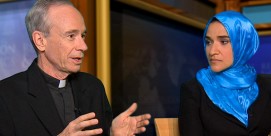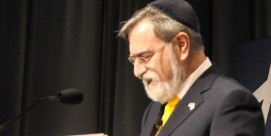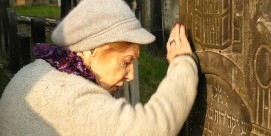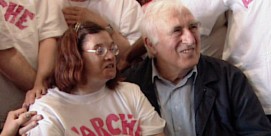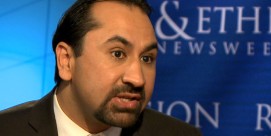Anti-Semitism in France
PAUL MILLER: The owner of this pharmacy not far from the Arc de Triomphe in Paris is thinking about leaving France because she is Jewish.
PAULETTE BENHAIM (through voice of translator): There is an anti-Semitism which you can feel. We are thinking about going somewhere else unless our security can be assured.
MILLER: Paulette Benhaim’s family had felt secure living in France for decades. But recently they’ve become alarmed by attacks against Jewish institutions and against Jewish children at school. They are not alone. In 2002, more than 2,300 French Jews left for Israel, twice as many as in 2001.
MICHEL FRIEDMAN (Chairman, European Jewish Congress): Jews in France and Jews in other countries are again threatened by an anti-Semitism that is growing, by right radicals, right extremists, by neo-Nazis, but also by extreme Muslims and Arabs who are using the situation for their aggression against Jewishness.
MILLER: There has always been a persistent strain of anti-Semitism here, although the French say it’s no worse than in other countries. An increase in violence — synagogues and school buses burned or vandalized, a rabbi stabbed — started last year because of events in the Middle East, specifically Israel’s treatment of Palestinians in response to suicide bombings. TV coverage of events in the Middle East, especially on Arab satellite channels watched by many Muslims here, is strongly pro-Palestinian. Jewish leaders fear that war in Iraq will mean more attacks against the country’s 700,000 Jews. American Jewish leaders who attended a recent conference in Paris between Catholics and Jews said too many French tolerate the violence.
Rabbi MARC SCHNEIER (President, North American Board of Rabbis): On the issue of anti-Semitism — that the French are bystanders, that they are afflicted with moral laryngitis — there is a deafening, deafening silence.
MILLER: But some Catholic bishops at the conference said anti-Semitism is overpublicized, and the violence is the work of a small number of young people of Arab descent.
Cardinal JEAN LUSTIGER (Archbishop of Paris): I don’t think it’s very deep nor significant. Maybe it’s very aggressive in some places.
SELIM BEN ABDELSELLEM (France Fraternite): If you speak about the Muslim-Arab community in France, I think that most of them live in peace with the rest of the French people and especially the Jewish.
MILLER: There are four to six million Muslims, mostly Arabs, in France. They are a diverse community, but there is a substantial element that has become the underclass in France — poor, unemployed, and undereducated. Four percent of immigrant children get into university, compared to 25 percent of those of French stock. They feel discriminated against and until recently have not had an official voice. In suburbs such as Montreuil, the high-rise apartment blocs are now filled with second- or third-generation Arabs and Muslims who feel neither French nor foreign and who are angry. Some are angry enough to become violent, or to join extreme Islamist organizations. Muslim leaders say the government has done little for their community.
Mr. ABDELSELLEM: I think it is necessary for them to care about this subject and to do something to change the law and to have a positive action on the way of thinking.
MILLER: The government of President Jacques Chirac says it is helping both Jews and Muslims. The government toughened penalties for anti-Semitic acts and is trying to stop anti-Semitism in schools, which the education ministry calls a real danger. It says there were almost 500 incidents in the fall term alone. It blames Arab and Muslim teenagers. France’s interior minister, Nicolas Sarkozy, has been denouncing discrimination in all forms.
NICOLAS SARKOZY (French Interior Minister — through voice of translator): It’s not a situation of Jews on one side and the rest on the other. All patriots who love the Republic and love France will never accept that anyone is inferior by virtue of their religion, their place of birth, or their skin color. We have zero tolerance for that kind of thinking.
MILLER: The government has now recognized Islam by naming a Muslim council that is the equal of official bodies for Catholics, Protestants, and Jews. It gives the government someone to talk to about education, employment, and possible terrorism. Minister Sarkozy said making Islam an official religion would help offset underground extremism that breeds terrorism. The government is trying to deal with tensions between two large minority communities. The concern now is that war in Iraq may exacerbate those tensions and the violence they might produce.
For Religion & Ethics NewsWeekly, I’m Paul Miller in Paris.

